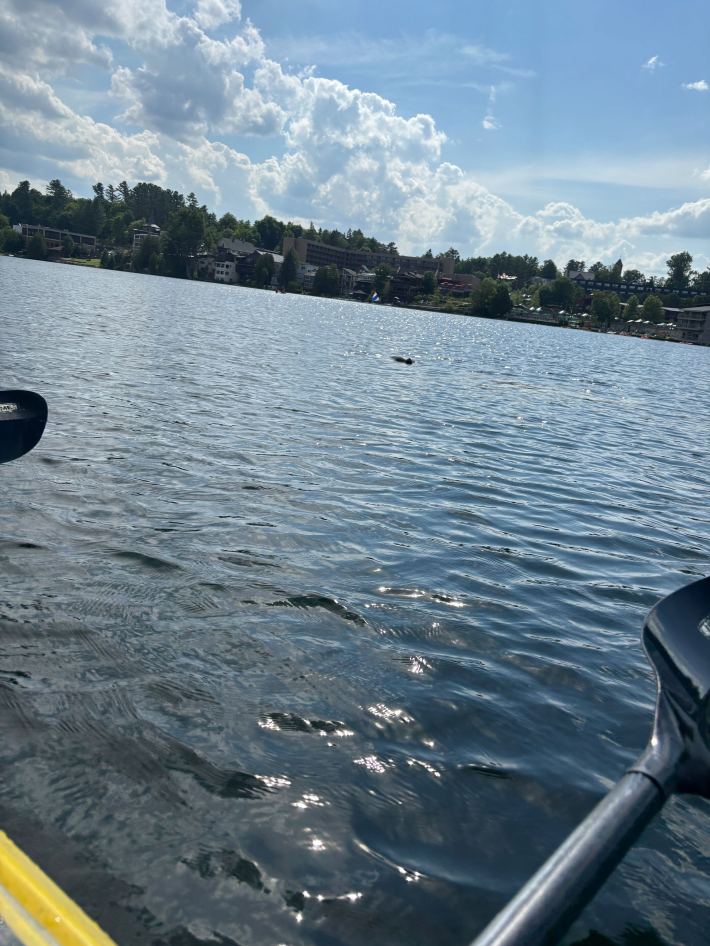Kathryn Xu: This weekend, my family and I went up to Lake Placid, where I saw several loons. As is the case when I see birds of note, I informed Barry Petchesky of this fact, only to discover that I was not the only Defector staffer to recently see loons and subsequently inform Barry Petchesky of the fact. What are the odds!
Sabrina Imbler: I am no statistician, but I imagine they are quite low! I spent the past month in the Adirondacks, and had no idea Kathryn also came up to the beautiful North, and the land of loons. I too saw loons on a lake and informed Barry Petchesky, because this is simply how things are done here. Barry then told me that Kathryn had also seen loons, and this is all the context you need to understand how we arrived here, in this blog. Kathryn, was this your first loon sighting? What did you know of loons before this weekend?
Kathryn: This was my first loon sighting, and as I learned, I knew very little about loons beyond their linguistic significance. But even as I say that, I’m not sure that the etymology of “loon” in the “crazy” usage actually comes from the bird. According to Merriam-Webster, it’s debated; another possibility is that it’s just Scottish!
Sabrina: Whoa, I had entirely forgotten that “loon” was a word meaning anything but the bird. I am also unsure if there is a link between the two words, but this blog post on loon etymology would probably clear things up.
Kathryn: My ignorance of loons was such that when I first saw a loon while kayaking, I thought it was a duck. To my great shame, I went so far as to ask these two other kayakers who were also looking at the loon, “What kind of duck is that?” That is how I learned what loons looked like. This is also when I took the only photo of a loon I got the entire weekend.

Sabrina: I hope you feel no shame about your lack of prior loon knowledge. Loons are very regional! I knew about them primarily because one of my best friends, Siobhan is from Minnesota and loves loons. She has a loon tattoo. Once I got her a glow-in-the-dark loon shirt for her birthday, and I remember when I was buying the shirt, I was like, This bird looks crazy. This is an extremely metal bird. You could describe a loon as a black-and-white bird the same way you might describe a rainbow as stripes in the sky. It does not capture the pure majesty of glimpsing the loon on the lake and seeing that wild checkerboard pattern erupting from the water.
Kathryn: They are so patterned, especially with their breeding plumage, which I learned about, as I tried doing some retrospective research to flesh out my loon knowledge. And they have red eyes, which I am admittedly not the biggest fan of, but really does give them some extra visual oomph.
Sabrina: I have to say, I loved the red eyes. I think if the loons simply had that distinguished checkerboard pattern and regular black eyes, they would appear aloof and reserved, like many of the people who have summer homes in the Adirondacks. But those beady red eyes made me recognize the sheer power of the loon, a bird that I later learned is not to be fucked with, at least if you are another loon. I was staying in a sort of a lodge on a lake with two loons, and everyone else at the lodge was talking about the loons every day. They were the clear rulers of the lake, and we were obsessed with them. In these conversations, that’s how I learned that a lake can only have two loons, because the birds are so territorial. If a loon encroaches on another loon’s territory, they will fight to the death. I later confirmed this by skimming the 2008 paper “Fatal battles in common loons: a preliminary analysis.”
Kathryn: “A preliminary analysis” implies the existence of further analyses.
Sabrina: And that is the work we are doing here, I think. That’s the title of our blog: "Fatal battles in common loons: a subsequent analysis." What was your take on the loons’ vibe?
Kathryn: So, while I was on the lake, I was totally convinced that there were more than two loons there because they would dive and then reappear, and somewhere the lines got crossed in my brain. My roommate has an aspirational bit where she hopes to one day have three black cats and tell people that she only has one cat but it’s very fast, and I was basically having the opposite of that experience: I was convinced there were, like, four loons when it was just two moving all over the place. Because I was in a kayak, I was irrationally concerned about rowing over where the loons were diving, in case I blocked their exit.
Sabrina: The loons are definitely too swift and smart for us to touch, even accidentally with a paddle.
Kathryn: And they can really dive! Apparently British people call them divers, which is one thing the Brits have gotten correct. They really are diving.
Sabrina: They really are diving! And they are constantly poking their heads underneath the water to scan for food. Did you see the loons eat or catch anything?
Kathryn: Oh, man, I don’t think so. I was mostly noting their movement. Did you?
Sabrina: I was not so lucky. Maybe they were eating things, but they were really so far away. And when I was in my kayak, I didn’t want to disturb them. But I loved hearing them call at night. Or rather, the first night, I was very scared by their wails, which are kind of a haunting howl, a very anguished sort of song. But then I felt reassured by this melancholy, not unlike the way you can have fun listening to Mitski. Did you hear them?
Kathryn: I didn’t get to hear any Mitskicore wailing! Which I’m quite sad about. We were staying in a hotel, and it wasn’t quite directly on the loon lake, which is what I’m attributing the lack of wailing to. In the morning, I heard this crazy bird sound that I, with my perfect lack of loon knowledge, attributed to the loons, unfairly or not.
Sabrina: What was the other crazy bird sound like? Did you record it? One night when I was on the loon lake I was kayaking by a marshy part and there was this horrible repeating sound, like a human breathing raspily, only we were on the lake, so it couldn’t have been a human … right? Anyway I lost an hour on r/Adirondacks trying to sleuth out the mystery sound but I still don’t know what wretched frog or some such was doing that.
Kathryn: Listening back to all the loon sounds, I think it might have actually been a loon! I wish I had taken a video—it sounded a bit like a warbling laugh, similar to the flight calling or tremolo calls in the field guide. So possibly my perfect lack of loon knowledge still resulted in a correct guess, and I did actually get to hear a loon.
Sabrina: That’s incredible, and a good argument for not knowing stuff but having strong opinions anyway. Warbling laugh sounds very loon-like to me. I was using my Merlin app a lot to identify tiny birds I could not see, and it was so funny hearing all of these beautiful and complex songs from purple finches, song sparrows, and red-eyed vireos, and then for all the warbling songbirds to be drowned out by the incredibly loud yodeling loons. I had to respect it.
Kathryn: The multi-definitional loon. They sure do sound crazy.
Sabrina: What was your emotional experience of seeing the loons? Did they conjure any feelings for you?
Kathryn: I’m not a huge birder like some others on staff, but I do really enjoy the small doses of encountering a new regional-ish creature and being able to learn about it, like magpies in China, and now loons in Upstate New York. The loons themselves were so striking visually that I felt like I had intruded upon their territory. I think the red eyes always contributed to the sensation. When I was on my kayak, I was on their lake, and I could accept that. I am not looking to be a case study in “Fatal battles between common loons and humans: a preliminary analysis.”
Sabrina: You could have been the first Defector eulogy to be filed under Birdfector ... but I am thankful you did not have to battle a loon. A look from a loon was enough to remind me that I was in many ways a visitor on that beautiful lake. When I left, the loons would remain. I am also not a huge birder, but something about the fact that a lake could have two and only two loons made me think about how long loons have been on this lake, just generations and generations of loons overseeing such a beautiful space and diving and flapping and staring down bears and boaters with those wrathful red eyes. I was very moved. I also felt jealous of the loons, who get to spend many seasons of their lives swimming and flapping around such a beautiful lake. It seems like a nice way to live, the exception being the occasional fatal battle. Each time I saw the loon, I couldn’t help but wonder, how many other loons had he killed?
Kathryn: Should we all have the luxury of floating on a lake and committing acts of violence and diving—splash!






